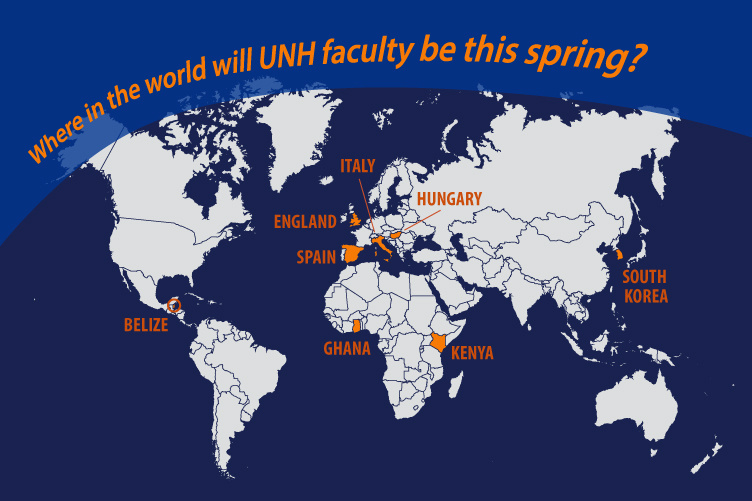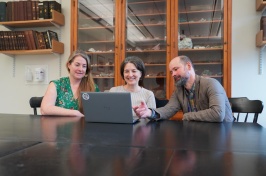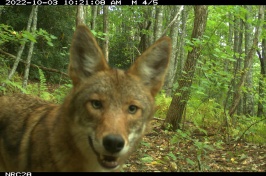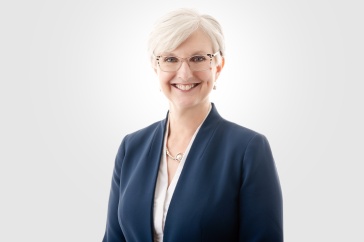
Faculty members are once more scattered around the globe, either sharing their expertise or increasing their knowledge, thanks to a variety of fellowships, established programs and research projects. Here’s a sampling of where they are in the world.

Meghan Howey, associate professor of anthropology, is in Hungary with the Humanities Budapest Program, designed to provide undergraduates with an intensive study abroad experience focusing on modern Hungarian and Central European history and culture. Howey, faculty member in residence, is teaching two of the program’s four courses.
The James H. Hayes and Claire Short Hayes Professor of the Humanities, Howey’s area of specialty is archaeology: anthropocene, landscape, geospatial modeling, cultural heritage and sustainability.

Ben Towne, clinical assistant professor in the kinesiology department, is working with the U.S. bobsled and skeleton teams in PyeongChang, South Korea, the future site of the 2018 Winter Olympics.
Towne has been providing athletic training services to America's elite athletes for a decade, previously serving during various World Cup tours and the 2014 Sochi Olympic Games.
“It's been a true honor and a privilege to work with these athletes and coaches at this level of sport. I'm thankful every day that I can follow my clinical passion,” Towne says.

Douglas M. Lanier, professor of English, received the Global Shakespeare Centre Distinguished Chair Fulbright award that has him at Queen Mary University of London, and the University of Warwick, studying, lecturing and conducting research.
Lanier was selected from a strong applicant pool to work on a book on screen adaptations of "Othello" from across the globe and to teach classes at both universities. His work focuses on early modern English drama and poetry as well as modern performances and adaptations of Shakespeare's and other early modern dramatists' works.

Iago Hale, assistant professor of specialty crop improvement, was in Nairobi, Kenya, in January at the World Agroforestry Centre where he goes every six months as part of the core instructor team for the African Plant Breeding Academy, the capacity-building initiative of the African Orphan Crops Consortium.
Hale also traveled to Ghana where he goes annually as part of an NSF-BREAD project.
“The project focuses on the genome-enable domestication and breeding of shea tree, a key agroforestry species that is the source of cooking oil and income to more than 18 million households across the Sahelian zone of sub-Saharan Africa,” Hale says.
Hale is interested in the characterization, maintenance and utilization of crop genetic diversity as a means of enhancing small farm viability, rural livelihoods, food security and ecosystem integrity.

Lina Lee, professor of Spanish and director of the Granada program, is in Spain this semester with a group of 11 UNH students who are taking courses through the Centro de Lenguas Modernas, a division of the University of Granada. In addition to cultural visits and events, students travel with Lee to several of Spain's major cities , including Madrid, Toledo, Segovia, Sevilla and Merida.
Lee's area of specialty includes linguistics, second language acquisition, applied linguistics and computer assisted language learning.
Stephen Brunet, associate professor of classics, is in England serving as director of the UNH London Program.

Study takes place at Regent's University London, a center for international study abroad that houses, among others, the UNH program, which enables students to spend a semester or a year in the United Kingdom while making normal progress toward a U.S. degree.
Co-author of “Anthology of Classical Myth: Primary Sources in Translation,” Brunet's areas of specialty are Greek and Roman sports, ancient history, Greek and Roman prose authors and museum studies.

Katie Edwards, assistant professor of psychology and women's studies, is in Nairobi, Kenya, on a faculty international travel grant, where she's learning more about "No Means No Worldwide," a progressive sexual assault initiative aimed at risk reduction and prevention. The measure has been implemented in the city’s six largest slums.
"The conversations that I had with the instructors and the time I spent observing them in the classroom were by far the most impactful and meaningful part of my entire journey. I am so very grateful to these individuals, for their impact that they had on me and the impact that they are having on the thousands of youth they reach," Edwards says.
Edwards is a faculty affiliate of Prevention Innovations and the Carsey School of Public Policy. Her interdisciplinary program of research focuses broadly on better understanding the causes and consequences of interpersonal violence, primarily intimate partner violence (IPV) and sexual assault (SA) among adolescents and young adults.
Eleanor Harrison-Buck, an associate professor of anthropology, has been awarded a $50,000 Whiting Public Engagement Fellowship to establish a public history museum in Belize focusing on the Kriol (Creole) community. More than a third of the population of Belize is part of the Kriol community descended from enslaved Africans brought to the country by Europeans in the 18th and 19th centuries.

Harrison-Buck will work in collaboration with Kriol community leaders, educators and local and regional authorities. The new museum, housed in a building donated by the town of Crooked Tree, will include local oral histories, artifacts, images and stories to present the culture to tourists, teachers and students. Her teachings focus on Mesoamerica/Maya archaeology, divine kinship, political collapse, social identity, personhood, sacred landscapes and religious ideology.
During the January term, the following faculty members were abroad:
Scott Smith and Susan Curry, Rome, for the classics course, “Building Rome.”
Sue Hertz, London, for a travel writing course.
David Kaye, London, for the theatre course, “London Experience.”
-
Written By:
Jody Record ’95 | Communications and Public Affairs | jody.record@unh.edu






















































